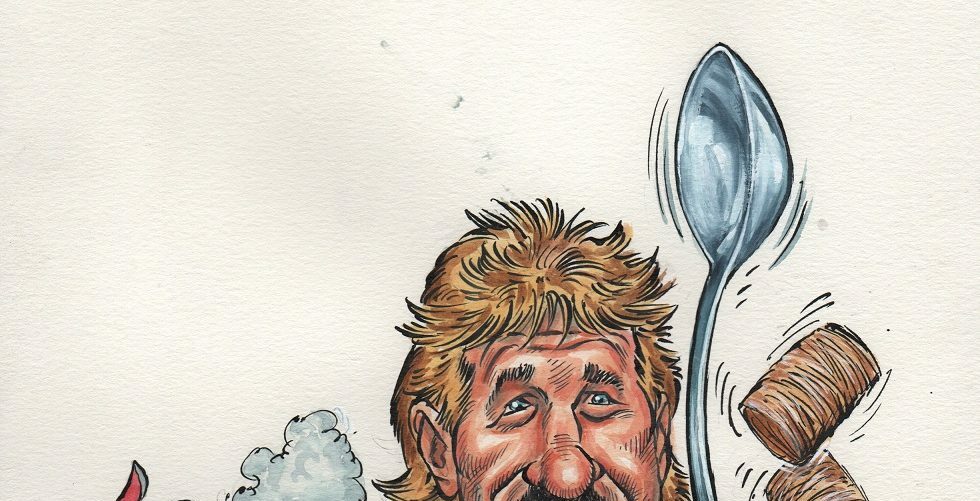Twitchers are an excitable bunch, for whom a fleeting glimpse through the binoculars of a lesser spotted, pink crested, hook billed Siberian marsh warbler is liable to provoke an unrestrained whoop of delight.
And you can well imagine something similar occurring at Taunton last week when the sighting of another rare bird may have prompted even that breed of Essex supporter who thought he’d seen it all before to give his next door neighbour a violent shake.
“Wake up! You won’t believe this, but I think I’ve just spotted Alastair Cook opening the batting.”
A couple of decades ago, county cricket spectators saw their England players all the time, with one or two exceptions. When Bob Willis, for example, turned his arm over for Warwickshire some wag in the crowd would unfailingly shout:
“Bowler’s name?”
But since central contracts the ECB, all England player sightings on county grounds have been placed – alongside the white rhino and the snow leopard – on the endangered species register.
In fairness to the ECB you sometimes have to protect a chap from himself, which is why Jonny Bairstow was prevented from appearing in Yorkshire’s opening two games after a ferocious workload of three days’ cricket since mid-December. Andrew Strauss has doubtless arranged for regular visits from a home helper, to make sure the England wicketkeeper doesn’t overdo the bending down by having to tie his own shoelaces.
By contrast, as a one-format specialist in a summer schedule without a Test match until July, Cook was given permission to play for Essex against Somerset, and probably exceeded ECB health and safety guidelines by batting for quite a long time.
Although the thing that most caught my own eye when Cook raised his bat to acknowledge what turned out to be a match-winning century was the advertisement on his Essex sweater.
Instead of the one we’ve come to associate with him, with the three lions on the front, this one contained a message inviting all those Chelmsford residents in need of re-tiling a roof, or pointing the chimney, to get in touch with a firm called D&B Scaffolding. And what better man to deliver the message, given that a Cook century is seldom anything other than methodically constructed.
It was all done tastefully enough, which has usually been the case with a sport whose association with advertising goes all the way back to W.G. Grace. The good Doctor was not, for obvious reasons, an early ambassador for Gillette, but instead earned a few extra quid for extolling the virtues of Coleman’s mustard.
Then there was Denis Compton, who was well remunerated for slicking his hair down with Brylcreem, and in later years there was even an opportunity for cricketers who didn’t have any hair – or not much at any rate – to make a bob or two.
Graham Gooch was the forerunner for a number of players, Shane Warne and Ricky Ponting among them, promoting hair replacement, although I always thought it didn’t do the game itself many favours, given the number of schoolchildren who must have grown up thinking that cricket makes your hair fall out.
Tony Greig was a bit too early to cash in before his own locks fell out, although he was the first cricketer to agree to take all his clothes off in return for an advertising contract. Photographed naked, save for a jockstrap, box, and batting gloves, along with the slogan: “When I face the pacemen, it’s good to know St Peter is protecting me.”
Ian Botham was an obvious choice for Shredded Wheat when the cereal manufacturers wanted to send out a message that only tough guys could manage three of the things for breakfast, and that the regulation two was strictly for wimps.
However, quite why the makers of a garden spade should have thought that the South African all-rounder Jacques Kallis was the ideal man to promote their product is a tough one to work out, and even odder was the message selected as its major selling point.
Namely, that it was the best spade on the market for burying sheep.
There was a time when every cricket competition seemed to be named after a packet of fags, and before every home Test series there was a regular one-day tournament between England and the touring side named after a petrol company.
I once asked the Texaco rep, at the traditional pre-series reception for the media, how he thought cricket could possibly sell petrol, and he replied: “Well, given the choice, would you fill up with Texaco, or a brand you’d never heard of?”
To which the obvious answer, to me at any rate, was: “If it was cheaper, and on the same side of the road, it would be the brand I’d never heard of.” It was a dangerous thing to say when there was free wine and complimentary canapés at stake, but contrary to the widely held view of freeloading journalists, we can’t always be bribed.
Years ago, when the home Test series was sponsored by Cornhill Insurance, their promotional girls went round the Press box at writing-up time tapping us all on the shoulder and saying: “Don’t forget now. It’s not the second Test, it’s the second Cornhill Insurance Test.” I actually did as I was told on one occasion, but only after the office phoned and told me I was a couple of words short.
Advertising in cricket – whether it be petrol, insurance, scaffolding, or spades for burying sheep with, is fine if it’s not too intrusive. Which reminds me of the time the late Jack Bannister, having moved from the BBC to a commercial station, was contractually obliged during commentary to plug the sponsor.
You’d turn on the radio, and there would be Jack saying something like: “And that ball moved off the seam just enough to find the edge and it was caught pretty comfortably at first slip. And don’t you get caught out with an uncomfortable chair at work. Give Regus Office Furnishings a call today.”
And every time I saw him I’d say: “Jack, whatever they’re paying you, it’s not enough.”
This piece originally featured in The Cricket Paper, April 21 2017
Subscribe to the digital edition of The Cricket Paper here












